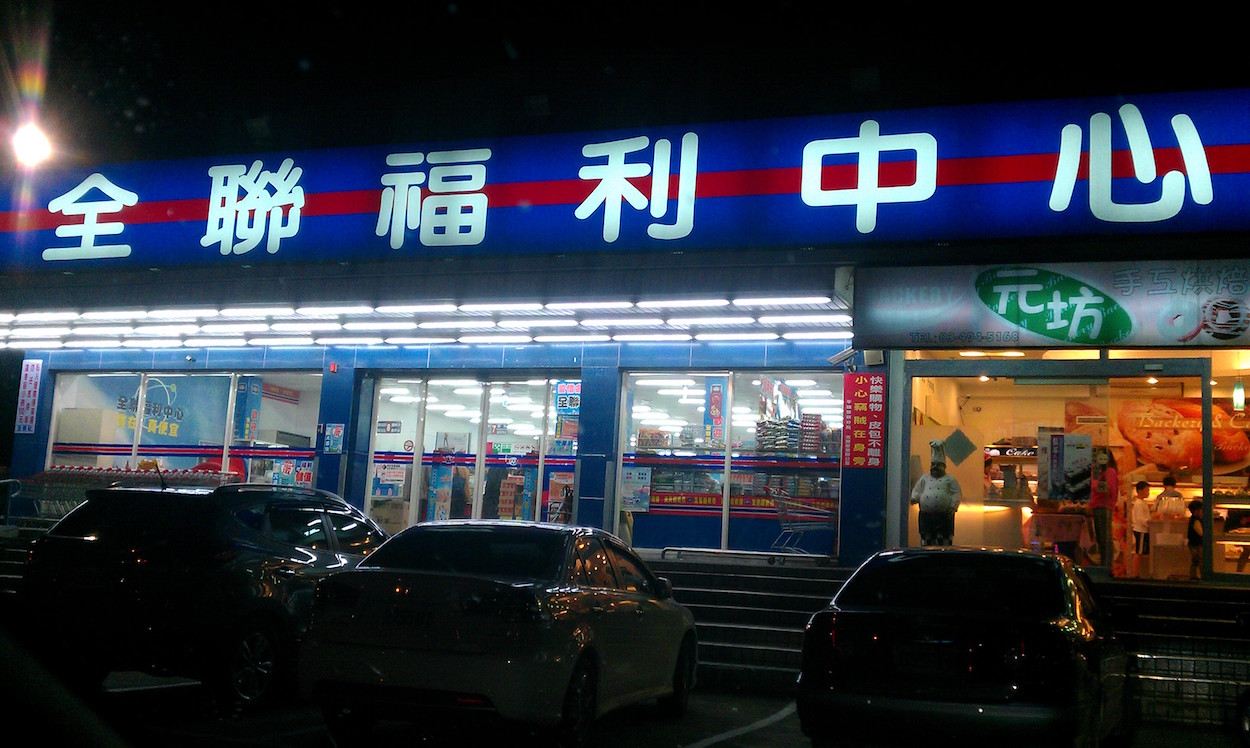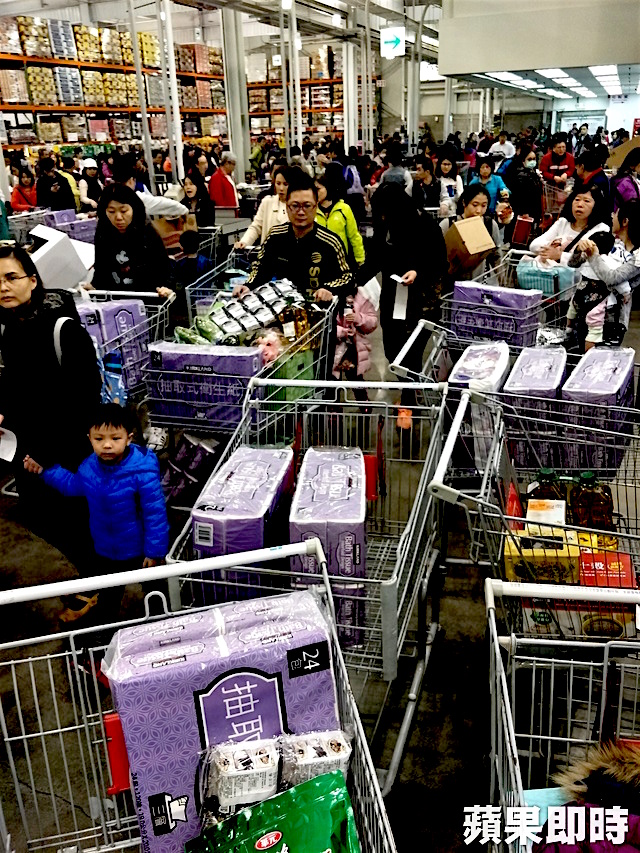by Brian Hioe
語言:
English
Photo Credit: UDN
ALARM IN the past week regarding planned hikes in toilet paper prices in Taiwan has been bizarre, leading to a consumer panic in which entire stores have been sold out of toilet paper. Toilet paper prices are set to rise next month by 10% to 30%. No less than the Executive Yuan has weighed in on the matter, urging that there is no need to panic about possible toilet paper shortages.
While toilet paper suppliers justify the raises by citing raises in pulp prices on the international market, controversy has been heated enough that the Executive Yuan has stated that it will look into whether toilet paper suppliers have colluded to raise prices. The Executive Yuan has stated that toilet paper suppliers have done this in the past, or offered false justifications to hike prices, but that there has indeed been an increase in the expenses needed to produce pulp from toilet paper from $650 USD to $800 USD this time. However, the Executive Yuan also asserts that it will investigate wrongdoing. Likewise, the four major supermarket chains in Taiwan, Pxmart, RT-Mart, Carrefour, and A-Mart Taiwan, have vowed not to raise prices before next month or to stockpile toilet paper in anticipation of making further profits when prices rise. Some accusations have also made that involved companies leaked information regarding the price hikes beforehand to drive up demand.
 Photo credit: CNA
Photo credit: CNA
Yet although this controversy is strange and, in fact, humorous, what the controversy points to is how production for key consumer products in Taiwan is concentrated in the hands of a small set of companies, through a limited distribution network. This leads to monopoly-like conditions for some products in Taiwan in which companies can set prices as they will, or even force the government to comply with policy demands they make of it.
Though Taiwan does not have vertically integrated companies on the level of integration of Japanese keiretsu or South Korean chaebol, the Taiwanese economy is in fact dominated by conglomerates with vast holdings in a number of businesses. Examples would be Uni President, Far Eastern, Evergreen, Formosa Plastics Group, Want Want Group, Liberty Times Group, and others, to simply name a few. Notably, Far Eastern owns A-Mart Taiwan and Carrefour’s presence in Taiwan is a co-venture with Uni President.
While Uni President Far Eastern, and Evergreen are more well known as conglomerates, some conglomerates with wide and diverse holdings in a number of businesses escape public notice because they are most known for specific branches, as in the case of how Formosa Plastics Group has holdings in biotechnology, petrochemicals, and electronics, but is primarily known for its plastics, or how the Liberty Times Group is primarily known for its newspaper, the Liberty Times, but has holdings in the hotel industry, rental industry, banking, and job banks, such as the 1111 Job Bank, one of the major job bank websites for individuals seeking employment in Taiwan.
Uni President, a food manufacturing giant in Taiwan alongside other large companies such as Ting Hsin, Wei Chuan, and Want Want, proves particularly powerful because it owns 7-Eleven, the dominant convenience store in Taiwan and another choke point on product distribution networks in Taiwan. Sometimes it is joked that because 7-Eleven has such a dominant presence in terms of consumer product sales in Taiwan, Uni President is so powerful that it can act almost like a government ministry in terms of how it is able to make demands on the central government.
 PX Mart. Photo credit: Tzuhsun Hsu/Flickr/CC
PX Mart. Photo credit: Tzuhsun Hsu/Flickr/CC
And so concern that large conglomerates working with each other to hike prices for toilet paper and other key consumer goods reflects the nature of the Taiwanese economy in many ways. Namely, the Taiwanese economy is dominated by large companies to the extent that these are wholly valid concerns.
However, it also is a fact that Taiwanese salaries are generally low, and this is why concern can be high regarding price hikes for crucial consumer goods leads to such panic. The average monthly wage in May 2017 was approximately 38,000 NT and so, while raises in toilet paper prices may be small, every NT counts for many—particularly for those who have just entered the workforce and may simply be making a minimum wage of 22,000 NT a month, or those seeking to raise families on such salaries.
Indeed, big business magnates have sometimes demonstrated astounding insensitivity to the low salaries that particularly faced by young people, as observed in remarks by PX Mart president Hsu Chung-jen—a former 7-Eleven president and a key figure in the rise of 7-Eleven to become Taiwan’s dominant convenience store—scoffing at young people for frivolous spending on their low salaries, claiming that when he was entered the workforce was, he only made 9,000 NT per month but was able to live off of that and so young people are simply spoiled. Of course, the minimum wage in Taiwan in 1977 was 500 NTD per month and so Hsu was making 15 times minimum wage from the beginning of his work career, unlike many university graduates today.
While wage hikes have been suggested as a solution, with the Tsai administration suggesting the goal of gradually increasing the minimum wage to 30,000 NT. Yet given the concentration of production for crucial consumer goods in the hands of a small set of companies, it is possible that they will raise prices to compensate for any increase in wages, as some suggest is true of the toilet paper price hike.
 Photo credit: Apple Daily
Photo credit: Apple Daily
Taiwanese companies are also notorious for using shifts in government policy to justify cost-cutting or price-raising. Some reports have ensued, for example, that some Taiwanese companies false used the Tsai administration’s changes to the Labor Standards Act to raise prices by claiming that they were negatively impacted by these changes and forced to do so when this was not actually true, although it is true that other companies were negatively influenced by these changes. In general, in terms of business practices, Taiwanese companies often see raising prices or cutting costs as the only way to create growth—all of which occurs at the expense of the consumer.
As such, what the toilet paper controversy points to may be that deep structural issues with the Taiwanese economy exist and that reform needs to be taken regarding this. Unfortunately, one generally does not expect solutions to be arrived at anytime soon. And while mass panic about toilet paper in Taiwan may be humorous, in touches upon serious issues. Can mass panic about toilet paper be directed towards the root causes of this issue, then?

